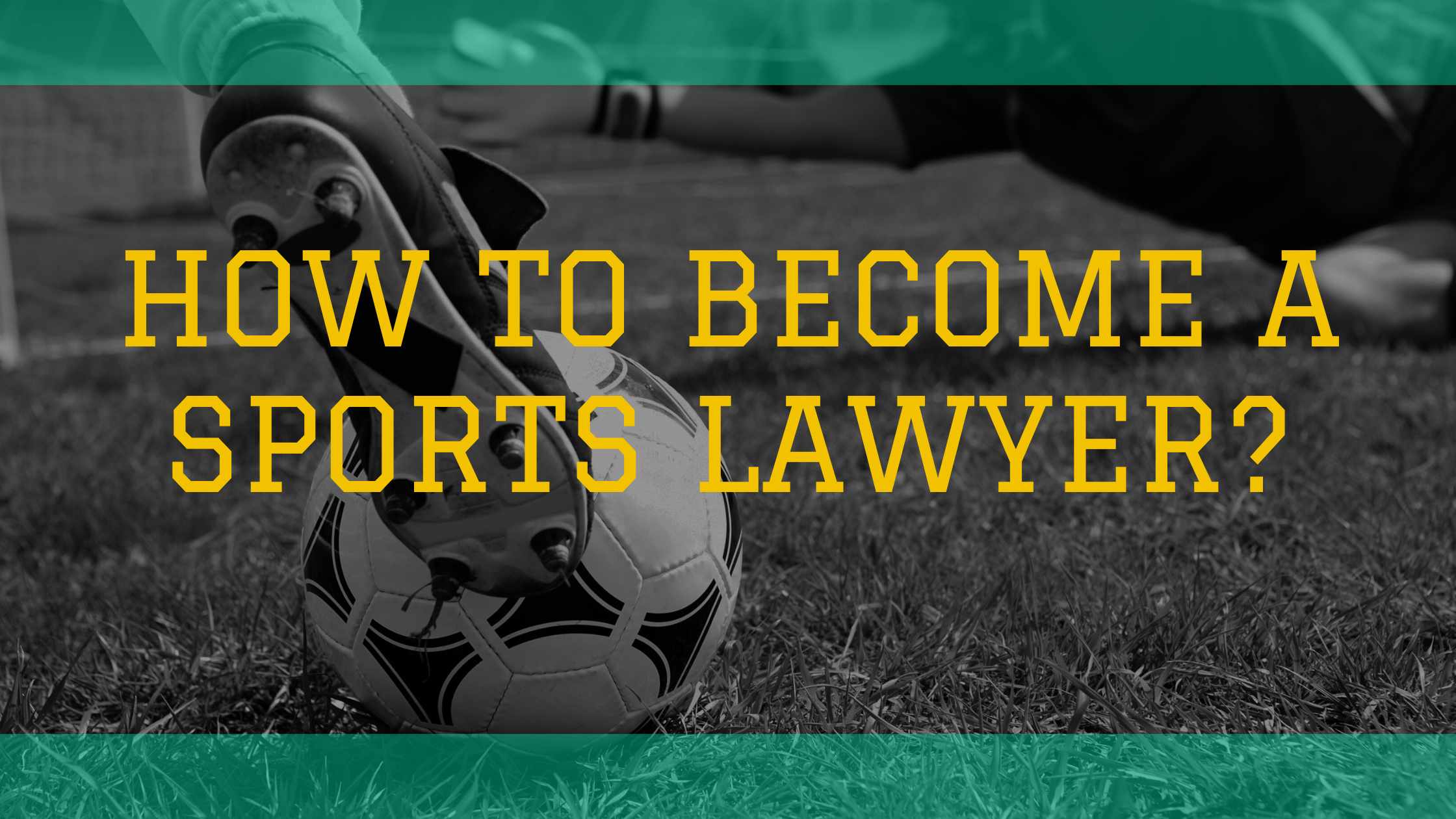How to Become a Sports Lawyer?

To become a sports lawyer, you need to obtain a law degree and specialize in sports law. This field combines a passion for sports with legal expertise, allowing you to represent athletes, teams, and sports organizations in legal matters.
Table of Contents
Sports law is a specialized niche within the legal profession that deals with all legal aspects related to sports. From contract negotiations and sponsorship agreements to intellectual property rights and athlete representation, sports lawyers play a crucial role in ensuring fair play and legal compliance within the sports industry.
How to Become a Sports Lawyer? If you have a passion for both law and sports, becoming a sports lawyer may be the perfect career path for you. However, it requires a dedicated educational journey and specialized training in sports law. In this guide, we will outline the necessary steps to help you become a successful sports lawyer and navigate the exciting world where law and sports intersect.
Choosing A Path In Sports Law
If you have a passion for both sports and the legal field, becoming a sports lawyer can be a rewarding career path. Sports law encompasses a wide range of legal matters, including contract negotiations, intellectual property rights, and disciplinary issues.
Undergraduate Education
Your journey to becoming a sports lawyer starts with your undergraduate education. While there is no specific major required to pursue a career in sports law, some fields of study may better prepare you for this specialized area of practice.
Consider choosing a major such as:
- Sports management: Provides a strong foundation in the business side of the sports industry.
- Business administration: Develop your understanding of the financial and managerial aspects of sports organizations.
- Political science: Equips you with knowledge of government policies and regulations that influence sports.
- Pre-law: Builds a strong academic foundation for your future legal studies.
Regardless of your major, it is essential to maintain a high GPA and actively participate in extracurricular activities related to sports or law. These experiences will enhance your chances of getting into a reputable law school.

Law School
After completing your undergraduate degree, the next step is to pursue a law degree. Law school will provide you with the necessary legal knowledge and skills to practice in a variety of fields, including sports law.
During your law school experience, consider the following:
- Course selection: Choose elective courses that specialize in sports law. These classes will delve into topics such as contract negotiation, antitrust issues, and athlete representation.
- Participate in clinics or internships: Gain practical experience by working with sports law firms, sports organizations, or law clinics specializing in sports law.
- Join relevant organizations: Engage in student-run sports law associations or join professional organizations like the Sports Lawyers Association to network with industry professionals and stay updated on current trends and developments in sports law.
Specialization
Once you have completed law school, you may choose to specialize further in sports law. Obtaining additional certifications or focusing on a specific area within sports law can provide you with a competitive edge in the job market.
Consider specializing in:
- Intellectual property law: Focus on protecting trademarks, copyrights, and licensing agreements within the sports industry.
- Contract negotiation and drafting: Develop expertise in negotiating and drafting contracts for athletes, teams, or sports organizations.
- Arbitration and dispute resolution: Become skilled in resolving sports-related disputes through mediation or arbitration processes.
By selecting a specialization, you can become a sought-after expert in your chosen field, allowing you to provide valuable legal services to clients in the sports industry.
Becoming a sports lawyer requires a combination of legal knowledge, practical experience, and a genuine passion for sports. By carefully choosing your undergraduate education, excelling in law school, and specializing in sports law, you can pave a successful path towards a fulfilling and impactful career as a sports lawyer.
Gaining Relevant Experience
To become a sports lawyer, gaining relevant experience is crucial. Internships, volunteering, and networking in the sports industry can provide valuable practical knowledge and connections in the field.
Internships And Externships
Gaining relevant experience is crucial for anyone aspiring to become a sports lawyer. Internships and externships provide invaluable opportunities to get hands-on experience in the field. These programs allow aspiring sports lawyers to work alongside professionals and gain practical knowledge of how the industry operates. It is during these internships and externships that individuals can apply their theoretical knowledge to real-life scenarios.
Internships are usually short-term opportunities offered by law firms, sports agencies, or sports organizations. During an internship, individuals have the chance to work on specific projects, assist with legal research, and observe attorneys in action. This direct exposure to the legal side of sports helps students develop a deeper understanding of the intricacies involved and build the necessary skills for success.
Externships, on the other hand, are typically longer in duration and may be part of a degree program. They often involve working within the legal department of a sports organization or agency. Externships provide a more immersive experience, allowing individuals to learn from established professionals and witness the inner workings of the legal processes in a sports context. By participating in these programs, aspiring sports lawyers can gain insight into negotiation strategies, contract drafting, and other essential aspects of the profession.
Volunteer Work
In addition to internships and externships, volunteer work is an excellent way to gain relevant experience as a sports lawyer. While it may not always be directly related to the legal aspects, volunteering in sports-related organizations allows individuals to network with industry professionals and gain firsthand knowledge of the sports world. This involvement demonstrates a genuine passion for sports and a commitment to making a difference.
Volunteering opportunities can range from assisting with local sports events to contributing to youth sports programs. Even though the legal aspects may not be the primary focus, participating in these activities can provide valuable insights into the industry, help develop interpersonal skills, and create connections with people who may offer future career opportunities.
Networking
Building a strong network is essential in any profession, and sports law is no exception. Networking allows aspiring sports lawyers to connect with professionals, mentors, and potential employers in the field. Through networking, individuals can gain exposure to new opportunities, stay updated on industry trends, and develop relationships that may lead to job offers or collaborations.
Attending sports law conferences, industry events, and professional seminars can help expand one’s network. Volunteering in organizations related to sports law can also provide opportunities to connect with like-minded individuals. Additionally, joining online communities and participating in discussions on social media platforms can help establish a presence and engage with others in the field.
It is important to approach networking with a genuine interest in building relationships and offering value to others rather than solely focusing on personal gain. By nurturing relationships and staying connected with individuals in the industry, aspiring sports lawyers can increase their chances of finding relevant experience and advancing their careers.

Acquiring Legal Skills
Acquiring the necessary legal skills is crucial for anyone aspiring to become a successful sports lawyer. These skills are essential tools that will enable you to excel in this specialized field and effectively represent athletes, teams, and sports organizations. In this section, we will explore the key legal skills that every sports lawyer should possess.
Legal Research And Writing
Legal research and writing form the backbone of any legal practice, and sports law is no exception. As a sports lawyer, you will often need to conduct extensive research to find applicable laws, regulations, and legal precedents that pertain to a particular sports-related issue. This will require you to have a strong understanding of legal databases, case law, and legislative materials.
In addition to research, impeccable writing skills are crucial in order to draft legal documents, such as contracts, agreements, and legal opinions. These documents must be clear, concise, and well-structured to ensure that your client’s interests are protected and their rights are effectively represented.
Negotiation And Mediation
Sports law often involves complex negotiations between various parties, such as athletes, clubs, sponsors, and governing bodies. As a sports lawyer, your role will be to negotiate on behalf of your client to achieve the best possible outcome. This requires excellent communication skills, the ability to understand and articulate your client’s needs, and strong persuasive abilities.
In addition to negotiation, mediation skills are also highly valuable in sports law. Mediation is a process in which a neutral third party facilitates communication and helps parties to reach a mutually acceptable resolution. Developing the ability to mediate disputes can be crucial in resolving conflicts before they escalate into costly and time-consuming litigation processes.
Analytical Skills
Analytical skills are a fundamental part of being a successful sports lawyer. These skills involve the ability to analyze complex legal issues, identify relevant facts, and apply legal principles to formulate sound legal arguments. Sports lawyers are often faced with unique and challenging situations, such as contract disputes, anti-doping cases, and disciplinary actions. Having strong analytical skills will allow you to assess these situations effectively and provide strategic advice to your clients.
| Key skills for acquiring legal skills: |
|---|
| 1. Legal research and writing |
| 2. Negotiation and mediation |
| 3. Analytical skills |
Developing these legal skills will require dedication, continuous learning, and practical experience. Whether through internships, legal clinics, or attending relevant workshops and seminars, investing in your legal skills will not only enhance your chances of becoming a sports lawyer but also lead to a successful and fulfilling career in this dynamic field.
Building A Professional Network
Building a professional network is crucial for aspiring sports lawyers looking to establish themselves in the industry. Networking allows you to connect with fellow professionals, gain valuable insights, and open doors to new opportunities. In this section, we will explore three key strategies to effectively build your professional network in the field of sports law.
Joining Professional Organizations
One effective way to expand your professional network as a sports lawyer is by joining relevant professional organizations. These organizations provide a platform for like-minded individuals to connect, share knowledge, and collaborate on industry-related matters. By becoming a member, you gain access to a vast network of fellow sports lawyers and industry experts who can offer guidance and support.
Attending Legal Conferences
Legal conferences offer invaluable opportunities to establish connections with other professionals in the field. These events bring together legal experts, including sports lawyers, from around the world. Attending such conferences allows you to stay updated on the latest trends and developments in sports law while also providing a venue for networking. Engaging in conversations, attending seminars, and participating in panel discussions can help you forge meaningful connections with influential figures in the industry.
Building Relationships With Mentors
Another essential aspect of building a strong professional network is cultivating relationships with mentors. Mentors are experienced professionals who can provide valuable advice and guidance based on their own experiences. Seek out mentors who are established sports lawyers or industry leaders and develop a mentor-mentee relationship with them. This connection can be invaluable in terms of career guidance, access to opportunities, and industry insights.
To summarize, building a professional network is crucial for aspiring sports lawyers. Joining professional organizations, attending legal conferences, and establishing relationships with mentors are all key strategies to expand your network and enhance your career prospects in the field of sports law.

Navigating The Job Market
Securing a position as a sports lawyer may seem like a challenging task. However, with the right strategies and preparations, you can increase your chances of success. Navigating the job market requires a focused approach to developing an impressive resume and portfolio, employing effective job search strategies, and preparing well for interviews. Let’s explore each of these aspects in detail:
Resume And Portfolio Development
To stand out from the competition, it’s crucial to create a resume and portfolio that effectively highlight your skills and experiences in the field of sports law. Consider the following tips:
- Focus on relevant experiences: Highlight any internships, relevant coursework, or volunteer work related to sports law.
- Emphasize legal skills: Showcase your proficiency in legal research, writing, analysis, and negotiation.
- Showcase sports industry knowledge: Demonstrate your familiarity with sports regulations, contracts, and other legal aspects specific to the sports industry.
- Include academic achievements: Mention any honors, awards, or scholarships you have received during your educational journey.
- Highlight teamwork and leadership: Describe any experiences where you collaborated with others or took initiative in a leadership role, as teamwork and leadership are highly valued in the sports industry.
- Create a professional online presence: Develop a portfolio website or online blog to showcase your expertise and demonstrate your commitment to the field.
Job Search Strategies
When it comes to finding job opportunities as a sports lawyer, it’s essential to be proactive and strategic. Use the following strategies to enhance your job search:
- Utilize online job boards: Regularly search for sports law positions on platforms such as Indeed, LinkedIn, and specialized legal job boards.
- Network with professionals: Attend legal conferences, sports events, and join relevant professional associations to meet individuals who can provide valuable insights, recommendations, and potential job leads.
- Reach out to mentors and professors: Seek guidance from mentors or professors who have connections in the sports law field. They may be able to provide referrals or connect you with potential employers.
- Tailor your applications: Customize your cover letter and resume for each job application, highlighting the specific skills and experiences that make you a strong fit for the position.
- Consider internships or entry-level roles: While aiming for higher-level positions, be open to internships or entry-level roles that can provide valuable experience and help you establish connections within the sports law industry.
Interview Preparation
Preparing thoroughly for interviews is essential to make a lasting impression on potential employers. Consider the following tips:
- Research the employer: Familiarize yourself with the company or organization you’re interviewing with, including their clients, recent cases, and any relevant news or updates.
- Anticipate common interview questions: Practice answering typical interview questions that assess your legal knowledge, problem-solving abilities, and understanding of the sports industry.
- Showcase your passion: Highlight your enthusiasm for sports law, mentioning specific cases or situations that inspired your interest in the field.
- Prepare examples: Prepare concrete examples of how you have utilized your legal skills in sports-related contexts, such as resolving disputes or drafting contracts.
- Ask insightful questions: Prepare thoughtful questions about the company’s sports law practice, work culture, and potential growth opportunities to demonstrate your interest and curiosity.
- Dress professionally: Dress in appropriate professional attire, ensuring a polished appearance for the interview.
By focusing on resume and portfolio development, implementing effective job search strategies, and preparing well for interviews, you can confidently navigate the job market and increase your chances of becoming a successful sports lawyer. With dedication and perseverance, you’ll be well on your way to building a rewarding career in this exciting field.
Conclusion
Becoming a sports lawyer requires a combination of dedication, hard work, and knowledge of both the legal and sports industries. By obtaining a law degree, gaining experience through internships or work at sports organizations, and continuously staying updated on relevant laws and regulations, you can pave a path toward a successful career in sports law.
Remember, it’s not just about being passionate about sports, but also possessing a strong understanding of the legal framework that governs it. So, take that first step, seize opportunities, and make your mark in the ever-evolving field of sports law.
Introducing Jonah Plum, a legal luminary whose journey through the corridors of justice has been intertwined with the eloquence of the written word. Born and raised in the vibrant city of Seattle, Washington, Jonah's early fascination with language and debate laid the foundation for a remarkable career in law.
Jonah's scholarly odyssey began at Harvard Law School, where they immersed themselves in the study of jurisprudence, honing their analytical prowess and legal acumen. Armed with a law degree, they entered the legal arena, navigating courtrooms and boardrooms with a fervor for justice. Yet, it was the realization of the transformative power of the written word that led Jonah to pivot from legal briefs to the world of blogging.
A digital advocate in the truest sense, Jonah recognized the need for demystifying legal concepts and making them accessible to a broader audience. This blog, a virtual repository of legal insights, transcends geographical boundaries, connecting with a global readership hungry for clarity amidst legal complexities.
Beyond the black letter of the law, Jonah delves into the human stories that underscore the legal landscape. Their writing goes beyond legal analysis, weaving narratives that humanize the law, shedding light on its impact on individuals and society.






